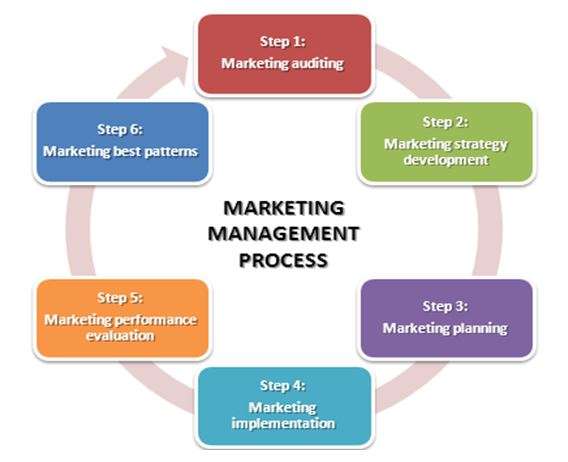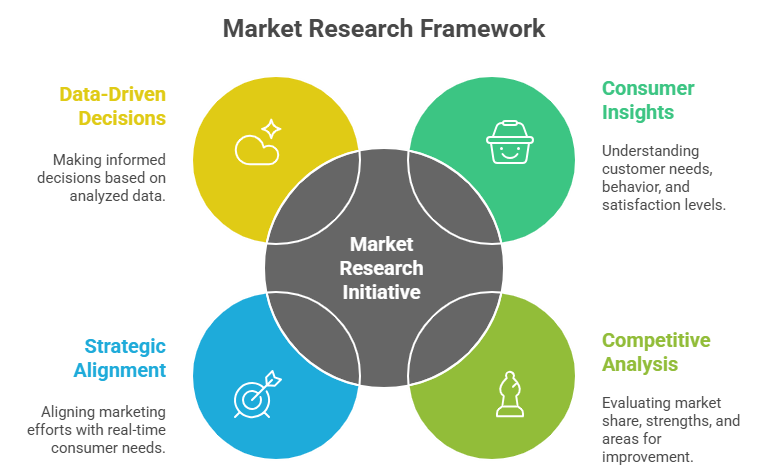
- Introduction to Marketing Management
- Case Background of Marketing Management
- Company Overview
- Marketing Challenge
- Market Research Conducted
- Marketing Strategy Applied
- Implementation and Execution
- Results and Outcomes
Introduction to Marketing Management
Marketing Management is a dynamic business discipline focused on planning, executing, and overseeing activities that bring products or services to target customers while achieving organizational goals. It involves analyzing market trends, understanding consumer behavior, and developing strategies to create value, build strong customer relationships, and drive profitable growth. Central to marketing management are the 4Ps product, price, place, and promotion, which are used to position offerings effectively in competitive markets. Marketing managers are responsible for conducting market research, segmenting the market, selecting target audiences, and crafting compelling value propositions. They also work to establish brand identity, manage distribution channels, and measure performance through various marketing metrics. In today’s digital era, marketing management blends traditional and digital tools, using social media, email, and content marketing to reach broader audiences and tailor customer experiences. With PMP Training professionals can manage marketing projects more effectively, ensuring better coordination and results. Strategic decision-making, innovation, and customer-centric approaches are essential components of successful marketing management, helping businesses adapt to rapidly changing environments and evolving consumer needs. By aligning marketing strategies with business objectives, organizations can enhance customer satisfaction, brand loyalty, and long-term profitability. Ultimately, marketing management is not just about selling products but about creating meaningful connections between businesses and their customers.
To Explore PMP in Depth, Check Out Our Comprehensive PMP Certification Training To Gain Insights From Our Experts!
Case Background of Marketing Management
- Digital Transformation in Marketing: The shift from traditional to digital marketing has forced companies to adopt new tools and strategies, including data analytics, SEO, and pay-per-click (PPC) advertising, to reach target audiences more effectively.
- Consumer-Centric Approach: Modern marketing management emphasizes understanding and meeting customer needs, preferences, and behavior patterns to deliver personalized experiences and improve customer satisfaction. Product Manager Roles play a crucial part in aligning marketing strategies with customer insights to create more tailored offerings.
- Competitive Landscape: In highly competitive environments, businesses use marketing management to differentiate their products, strengthen brand identity, and capture market share through unique value propositions.
Marketing management plays a crucial role in helping businesses adapt to competitive markets, especially in the digital age, where customer preferences shift rapidly. With the rise of e-commerce and online platforms, companies must not only understand traditional marketing principles but also embrace digital tools to stay ahead. This is particularly true for global leaders like Amazon, where effective strategies such as Amazon PPC management are vital for success.

- Role of Amazon in Modern Marketing: Amazon’s marketplace has become a central hub for digital commerce, where Amazon PPC management allows sellers to gain visibility, drive traffic, and increase conversions through strategic ad placements.
- Data-Driven Decision Making: Marketing managers rely on customer data, market trends, and performance metrics to adjust campaigns in real time and ensure maximum return on investment (ROI).
- Integrated Marketing Strategies: Successful marketing management blends online and offline strategies, ensuring consistency across channels while adapting to platform-specific needs, including tools like Amazon PPC management for e-commerce optimization.
- Changing Consumer Behavior: Customers are more informed and selective than ever before, making it difficult to predict purchasing patterns and deliver relevant messaging.
- Rising Digital Competition: With the explosion of online businesses, standing out among competitors has become a major challenge, especially when targeting similar audiences. Understanding the Functions of Product Management can help companies differentiate their offerings and better meet customer needs, driving growth and success.
- Limited Budget and Resources: Many companies struggle to allocate sufficient resources to execute high-impact marketing campaigns, which limits reach and effectiveness.
- Data Overload and Analysis: While data is essential, the inability to interpret large volumes of information often leads to poor decision-making, one of the common problems in marketing today.
- Maintaining Brand Consistency: As businesses expand across platforms, ensuring a unified brand voice becomes increasingly complex and requires close supervision by the marketing director.
- Adapting to Technological Advances: Keeping up with evolving marketing tools, automation systems, and platform algorithms poses a constant challenge for even the most experienced teams.
- Target Market Segmentation: The company segmented its audience based on demographics, behaviors, and buying patterns to tailor marketing messages effectively.
- Content Marketing Initiatives: Through blogs, videos, infographics, and social media posts, the brand used content marketing to provide value to customers, position itself as an industry leader, and improve SEO rankings.
- Social Media Engagement: Active presence on platforms like Instagram, LinkedIn, and Facebook helped the company interact with customers in real-time and increase brand visibility. Understanding How to Become a Product Manager allows professionals to drive these interactions strategically, aligning product development with customer engagement.
- Email Marketing Campaigns: Personalized email campaigns were designed to nurture leads, announce new products, and drive conversions.
- Influencer Collaborations: Partnering with industry influencers extended the company’s reach and credibility within targeted communities.
- Performance Tracking and Optimization: Marketing efforts were continually monitored and refined using key performance indicators (KPIs) to ensure effectiveness and return on investment.
Company Overview
Founded with a vision to deliver innovative solutions and exceptional customer value, the company has grown into a leading player in its industry, serving a diverse clientele across global markets. With a strong foundation in quality, integrity, and innovation, the company offers a wide range of products and services tailored to meet evolving consumer needs. Its operations span multiple sectors, including technology, retail, and digital commerce, positioning it as a versatile and forward-thinking organization. The company places significant emphasis on strategic planning, market research, and customer engagement to maintain a competitive edge. At the heart of its success is a dedicated leadership team, including a highly experienced marketing director, who plays a pivotal role in shaping the brand’s market positioning and driving its growth initiatives. Those who Master the TOGAF Framework for Career Growth bring valuable strategic insights that help guide the company’s long-term success. Under their guidance, the marketing team implements data-driven strategies, oversees campaign execution, and ensures alignment with overall business goals. The company’s customer-centric approach and adaptability to market trends have earned it a strong reputation and a loyal customer base. By continually investing in talent, technology, and process improvement, the company remains committed to delivering value, fostering innovation, and sustaining long-term growth in an ever-changing business environment.
Are You Interested in Learning More About PMP? Sign Up For Our PMP Certification Training Today!
Marketing Challenge
In today’s fast-paced and highly competitive market landscape, businesses face numerous obstacles that can hinder their marketing effectiveness. Rapid technological changes, shifting consumer behaviors, and increased competition all contribute to the growing list of problems in marketing that organizations must address. The role of the marketing director becomes critical in identifying these challenges, devising solutions, and guiding the marketing team toward sustainable success.
Are You Preparing for PMP Jobs? Check Out ACTE’s Project Management Interview Questions & Answer to Boost Your Preparation!
Market Research Conducted
To gain a clear understanding of customer preferences, market trends, and competitive positioning, the company undertook a comprehensive market research initiative aimed at gathering actionable insights to refine its marketing strategies. The primary objective was to identify consumer needs, purchasing behavior, and satisfaction levels related to its products and services. To achieve this, the team utilized various qualitative and quantitative methods, including focus groups, interviews, and online surveys. Professionals with PMP Training were able to effectively manage these research methods, ensuring streamlined processes and actionable insights. A key part of this initiative was to conduct market survey campaigns across different customer segments and geographical regions, which provided valuable data on customer expectations and brand perception. The collected data was analyzed to identify patterns, preferences, and pain points, enabling the company to make informed decisions about product development, pricing, and promotional strategies. This research also helped in understanding the competitive landscape, revealing key insights about market share, strengths, and areas of improvement compared to industry peers. By leveraging this research, the company aligned its marketing efforts with real-time consumer needs and positioned itself more effectively in the market. Overall, the decision to conduct market survey activities was instrumental in shaping customer-centric strategies and enhancing the company’s ability to deliver value in a dynamic business environment.

Marketing Strategy Applied
To achieve its business goals and strengthen its market presence, the company implemented a well-structured marketing strategy focused on customer engagement, brand awareness, and lead generation. The strategy combined both traditional and digital approaches, with a strong emphasis on data-driven decisions and personalized communication. A key element in this approach was the use of content marketing to educate, inform, and attract potential customers while building long-term brand loyalty.
Implementation and Execution
The successful implementation and execution of the marketing strategy required a structured approach, close coordination, and precise execution of each plan element. The marketing team worked collaboratively with cross-functional departments to ensure that all campaigns aligned with business objectives and were delivered on time. A key focus was on content marketing, where the team developed high-quality, engaging content tailored to the needs of the target audience. This content was then distributed across various channels, including the company’s blog, social media, and email campaigns, to build brand awareness and drive engagement. Understanding What is a Product Roadmap is key in aligning content distribution with long-term product strategy and goals. Additionally, paid advertising campaigns, including PPC advertising, were executed to increase visibility and drive targeted traffic to the website. The implementation process was supported by robust project management tools to track tasks, deadlines, and resources effectively. Content marketing played a pivotal role in nurturing leads through valuable resources and personalized messaging. Regular performance reviews ensured the execution was on track, and key metrics were used to refine strategies. Through continuous analysis and adjustments to campaigns, the marketing team ensured an agile approach that could respond to market changes. This meticulous implementation and execution approach contributed significantly to achieving marketing goals and driving the company’s growth.
Are You Considering Pursuing a Master’s Degree in PMP? Enroll in the PMP Masters Program Training Course Today!
Results and Outcomes
The results and outcomes of the marketing strategy were highly successful, with significant improvements across key performance metrics. By integrating PPC advertising into the campaign, the company saw a marked increase in website traffic and online visibility, leading to a higher conversion rate. The content marketing efforts also paid off, with engagement levels rising through blog posts, social media shares, and video content, which helped build stronger connections with the target audience. This increase in brand awareness directly translated into a 30% growth in leads over the quarter, surpassing initial expectations. Professionals with PMP Training played a key role in optimizing project workflows, contributing to this impressive growth. The implementation of PPC advertising further boosted the company’s return on investment (ROI) by targeting high-intent keywords and driving qualified traffic to product pages. Additionally, email marketing campaigns showed impressive open and click-through rates, indicating the effectiveness of personalized messaging. Social media engagement increased by 25%, and influencer partnerships helped amplify the company’s reach, further contributing to a stronger brand presence in the market. The results demonstrated a clear alignment between marketing efforts and business objectives, confirming the strategy’s success. Through continuous analysis and adjustments, the company was able to optimize campaigns, ensuring sustained growth and a competitive edge in the market.

